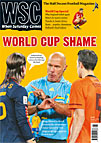 With more live football broadcasted every season, should players and managers start showing more respect on and off the field?
With more live football broadcasted every season, should players and managers start showing more respect on and off the field?
FA Cup broadcasts are often introduced by a montage of winning captains brandishing the trophy. Liverpool’s victory in the 1992 final never gets shown, however, because their captain, Mark Wright was clearly seen to shout “You fucking beauty!” as he raised the Cup over his head. Wright was one of the more belligerent players of his era so it’s quite likely that this was a spontaneous outburst. It’s also possible that it was an in-joke, referring to the fact that a Liverpool team-mate, John Barnes, had shouted exactly the same thing – seen in close-up, on live TV – when his last-minute free-kick forced extra time against Portsmouth in the semi-final.
Neither incident seems to have triggered a reaction in the media. More live matches are now transmitted every month than were shown in the whole of 1991-92. There will be moments in every live game that the camera catches a player swearing, at a team-mate, an opponent, a referee or in a celebratory hug after a goal. If every oath had to be accounted for in the post-match analysis, there would be no time to discuss the game.
So it’s difficult to understand why Wayne Rooney’s outburst after completing his hat-trick in Man United’s recent win at West Ham should have become one of the most widely discussed moments of the season, one that, at the time of writing, seems likely to be punished by a two-match ban.
Rooney’s mental state has been the subject of intense speculation since the 2010 World Cup when he swore into a TV camera in response to boos from the England fans after the match against Algeria. That incident did further damage to a public image already dented by the tabloids’ forensic exploration of his private life. Rooney has appeared to be unsettled ever since, his sullen demeanour not lifted by a recent improvement in form. Someone on a basic weekly wage of £250,000 can’t expect to receive much sympathy but some of the derision aimed at Rooney by sections of the press seems to be rooted in resentment that someone from his background should earn as much as he does.
It’s been said that if leading a blameless life was a prerequisite for being England captain, hardly anyone in the current international squad would be eligible for the armband. But they are fêted as celebrities by the same media that routinely vilifies them. Rooney’s outburst at Upton Park was caught on screen because a cameraman followed him around the side of the pitch and stuck a lens in his face. Sky boast about their ability to make the viewers feel as though they are in the middle of the action but while TV is keen to be seen as a participant in football – as witnessed by its ceaseless lobbying for the introduction of technology – it is still only an observer. Swearing at a referee rightly earns a card; doing the same thing to a camera lens might look crass but it shouldn’t be actionable.
The FA’s reaction to the Rooney incident has been presented as a boost to the ailing Respect campaign which is due for one of its regular overhauls. There is little doubt that players are becoming increasingly disrespectful to match officials, who are further undermined by television’s intense scrutiny of every decision. Managers could take steps to curb their players’ behaviour. If they don’t it can only be because they believe that intimidating an official can have positive benefits.
The Premier League’s chief executive, Richard Scudamore, is to give evidence to a parliamentary select committee on football this month, at which he is expected to announce that a retooled Respect campaign will be in place for the start of 2011-12. But there is no reason to think that it would rein in Wayne Rooney’s boss, who is more disdainful of referees than any other figure in football.
Sir Alex Ferguson received a five- match touchline ban for suggesting, among other things, that referee Martin Atkinson was biased in his handling of a 2-1 defeat at Chelsea in March. He seems unfazed by the punishment, saying: “I got done for what I considered fair comment.” Ferguson often seems to be beyond the control of the football authorities – his failure to speak to the BBC since 2004 is in direct contravention of League rules – but a more rigorous enforcement of the Respect guidelines would surely involve regular confrontations with him.
Scudamore should press for tougher sanctions against Ferguson whenever he oversteps the mark in his criticism of officials. Otherwise campaigns to boost referees’ authority will have no effect until their toughest opponent retires.
From WSC 291 May 2011
 The Iraqi media have been critical of Zico’s managerial performance and his reluctance to live in Baghdad, writes Sam Green
The Iraqi media have been critical of Zico’s managerial performance and his reluctance to live in Baghdad, writes Sam Green


